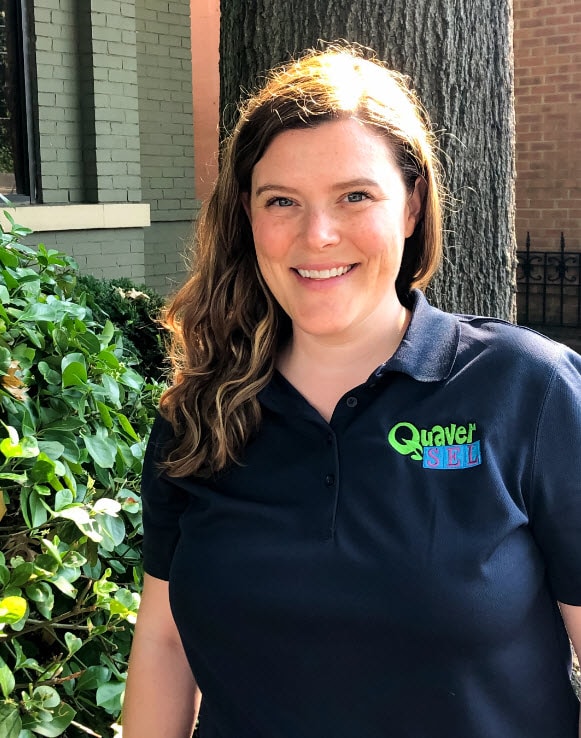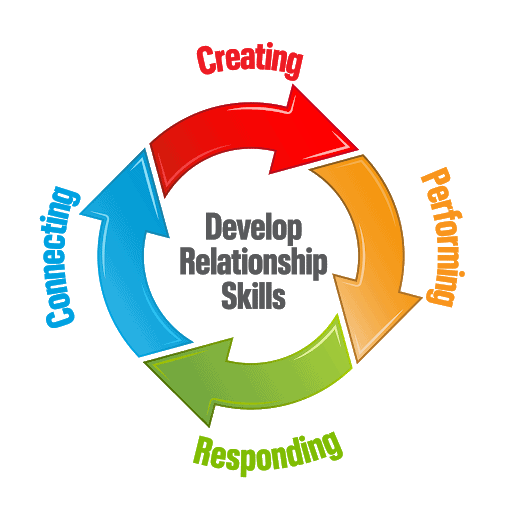/ News Posts / Building SEL Competency in the Elementary School Music Classroom
Building SEL Competency in the Elementary School Music Classroom
By Lindsey Jackson, sponsored by QuaverMusic
The music classroom is a place of amazing creativity and collaboration. It’s also the ideal place to build and nurture students’ social and emotional skills. Social and Emotional Learning (SEL) is receiving more and more attention as many schools are interweaving a focus on this part of a student’s development throughout the school day. While this work is primarily happening in grade level classrooms and through school counselors and social workers, the music classroom also provides ample and unique opportunities for SEL. By drawing connections between CASEL core competencies and the National Core Arts Standards, music educators can provide effective reinforcement of SEL through music.
The Collaborative for Academic, Social, and Emotional Learning (CASEL) defines SEL as “ . . . the process through which children and adults understand and manage emotions, set and achieve positive goals, feel and show empathy for others, establish and maintain positive relationships, and make responsible decisions.”
CASEL goes on to identify five core competency areas in which students should develop these SEL skills: self-awareness, self-management, social awareness, relationship skills, and responsible decision-making. All of these competencies are attainable within the elementary music classroom.
How can I incorporate SEL into my music classes?
In many ways, you already are! With a little intentionality, music educators can emphasize and reinforce the SEL concepts that are naturally embedded in music education. Let’s look at how the National Core Arts Standards and the CASEL core competencies work together:
- Creating/Self-Awareness: The act of creating and sharing a piece of music requires students to be vulnerable. Musical compositions reflect and convey our emotions, and allow us to show a piece of ourselves to others. Such sharing requires self-confidence and self-awareness, but it can also create feelings of vulnerability. Through the creative process, we discover our strengths by learning from successes and failures. By giving students opportunities to create their own compositions, experience improvisation and collaborate with others to make a new rhythm or melody, we provide opportunities for them to explore and express their emotions.
- Performing/Self-Management: In the process of preparing for performances, whether formal or informal, students are tasked with evaluating themselves and making refinements to showcase their best work. This process teaches and reinforces students’ self-discipline, self-motivation, and goal-setting. For students with anxious thoughts about performing, preparing for a performance can be a great opportunity to discuss and practice stress management skills.
- Responding/Responsible Decision-Making: When responding to different pieces of music or performances, students are invited to analyze, evaluate, and reflect on their experience as an audience member. The evaluation process gives students the opportunity to define the criteria of a meaningful performance in a way that translates into self-evaluation. Students may evaluate their own performances and provide “self-feedback” on successes and opportunities for improvement. The music classroom can also provide opportunities to strengthen decision-making skills through evaluating routines and procedures such as showing respect for the instruments they are playing, working with other students productively in groups, or dancing safely as a whole class during a folk dance.
- Connecting/Social Awareness: Through the use of world music, students are able to experience, embrace, and celebrate various cultures and learn about the history of communities outside of their own. Discussing world music exposes students to various perspectives and helps them develop a respect and appreciation for those who are different from them. Making connections with the emotions and experiences of others through music helps students develop empathy.
- Relationship Skills: Through the use of the four music domains—Create, Perform, Respond, and Connect—teachers are able to promote collaboration and communication between students, as well as provide frequent opportunities to build relationships and engage with one another. This is particularly true of ensembles that perform with one another. Your choir or Orff ensemble may feel like family over the course of the school year! The interpersonal skills learned in the music classroom can prepare students for future life experiences.
Music & SEL Crosswalk
Chances are, you’re already implementing SEL strategies in your classroom! Utilize the attached crosswalk to align the SEL skills being built and reinforced in your classroom with the musical concepts you are already teaching. This crosswalk would be a great way to advocate for all the important work happening in your music classroom.
For more ideas on how to support Social and Emotional Learning alongside your music program, visit QuaverMusic.com/SupportSEL.

Photo: Robb Cohen Photography & Video
QuaverMusic SEL was the sponsor for the NAfME 2019 National Conference Social Emotional Learning day-long learning experience.
About the author:
 Lindsey Jackson received her Master of Education in Professional Counseling with an emphasis in School Counseling and a Bachelor of Music in Vocal/General Music Education from Middle Tennessee State University. She has more than eleven years of experience as a music teacher and school counselor in elementary and middle school settings with an emphasis on de-escalation, restorative conversations, and behavior support. Lindsey currently serves as a content designer and SEL Coach for QuaverSEL.
Lindsey Jackson received her Master of Education in Professional Counseling with an emphasis in School Counseling and a Bachelor of Music in Vocal/General Music Education from Middle Tennessee State University. She has more than eleven years of experience as a music teacher and school counselor in elementary and middle school settings with an emphasis on de-escalation, restorative conversations, and behavior support. Lindsey currently serves as a content designer and SEL Coach for QuaverSEL.
Did this blog spur new ideas for your music program? Share them on Amplify! Interested in reprinting this article? Please review the reprint guidelines.
The National Association for Music Education (NAfME) provides a number of forums for the sharing of information and opinion, including blogs and postings on our website, articles and columns in our magazines and journals, and postings to our Amplify member portal. Unless specifically noted, the views expressed in these media do not necessarily represent the policy or views of the Association, its officers, or its employees.
Catherina Hurlburt, Marketing Communications Manager. January 7, 2020. © National Association for Music Education (NAfME.org)
Published Date
January 7, 2020
Category
- Social Emotional Learning
Copyright
January 7, 2020. © National Association for Music Education (NAfME.org)





